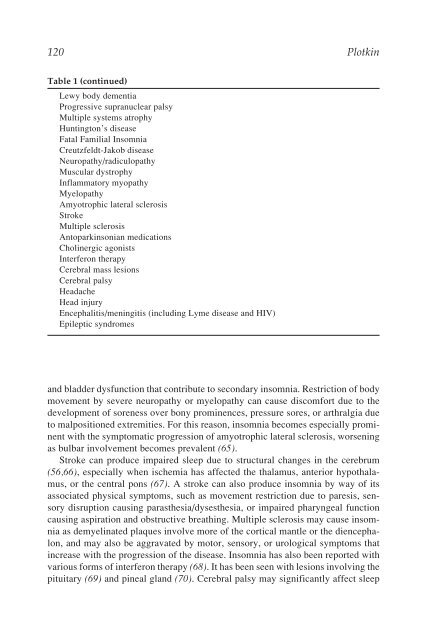Insomnia Insomnia
Insomnia Insomnia
Insomnia Insomnia
You also want an ePaper? Increase the reach of your titles
YUMPU automatically turns print PDFs into web optimized ePapers that Google loves.
120 Plotkin<br />
Table 1 (continued)<br />
Lewy body dementia<br />
Progressive supranuclear palsy<br />
Multiple systems atrophy<br />
Huntington’s disease<br />
Fatal Familial <strong>Insomnia</strong><br />
Creutzfeldt-Jakob disease<br />
Neuropathy/radiculopathy<br />
Muscular dystrophy<br />
Inflammatory myopathy<br />
Myelopathy<br />
Amyotrophic lateral sclerosis<br />
Stroke<br />
Multiple sclerosis<br />
Antoparkinsonian medications<br />
Cholinergic agonists<br />
Interferon therapy<br />
Cerebral mass lesions<br />
Cerebral palsy<br />
Headache<br />
Head injury<br />
Encephalitis/meningitis (including Lyme disease and HIV)<br />
Epileptic syndromes<br />
and bladder dysfunction that contribute to secondary insomnia. Restriction of body<br />
movement by severe neuropathy or myelopathy can cause discomfort due to the<br />
development of soreness over bony prominences, pressure sores, or arthralgia due<br />
to malpositioned extremities. For this reason, insomnia becomes especially prominent<br />
with the symptomatic progression of amyotrophic lateral sclerosis, worsening<br />
as bulbar involvement becomes prevalent (65).<br />
Stroke can produce impaired sleep due to structural changes in the cerebrum<br />
(56,66), especially when ischemia has affected the thalamus, anterior hypothalamus,<br />
or the central pons (67). A stroke can also produce insomnia by way of its<br />
associated physical symptoms, such as movement restriction due to paresis, sensory<br />
disruption causing parasthesia/dysesthesia, or impaired pharyngeal function<br />
causing aspiration and obstructive breathing. Multiple sclerosis may cause insomnia<br />
as demyelinated plaques involve more of the cortical mantle or the diencephalon,<br />
and may also be aggravated by motor, sensory, or urological symptoms that<br />
increase with the progression of the disease. <strong>Insomnia</strong> has also been reported with<br />
various forms of interferon therapy (68). It has been seen with lesions involving the<br />
pituitary (69) and pineal gland (70). Cerebral palsy may significantly affect sleep


